Natural Sciences
Mak Researchers in Drive to Improve Waste Management in Uganda
Published
2 years agoon
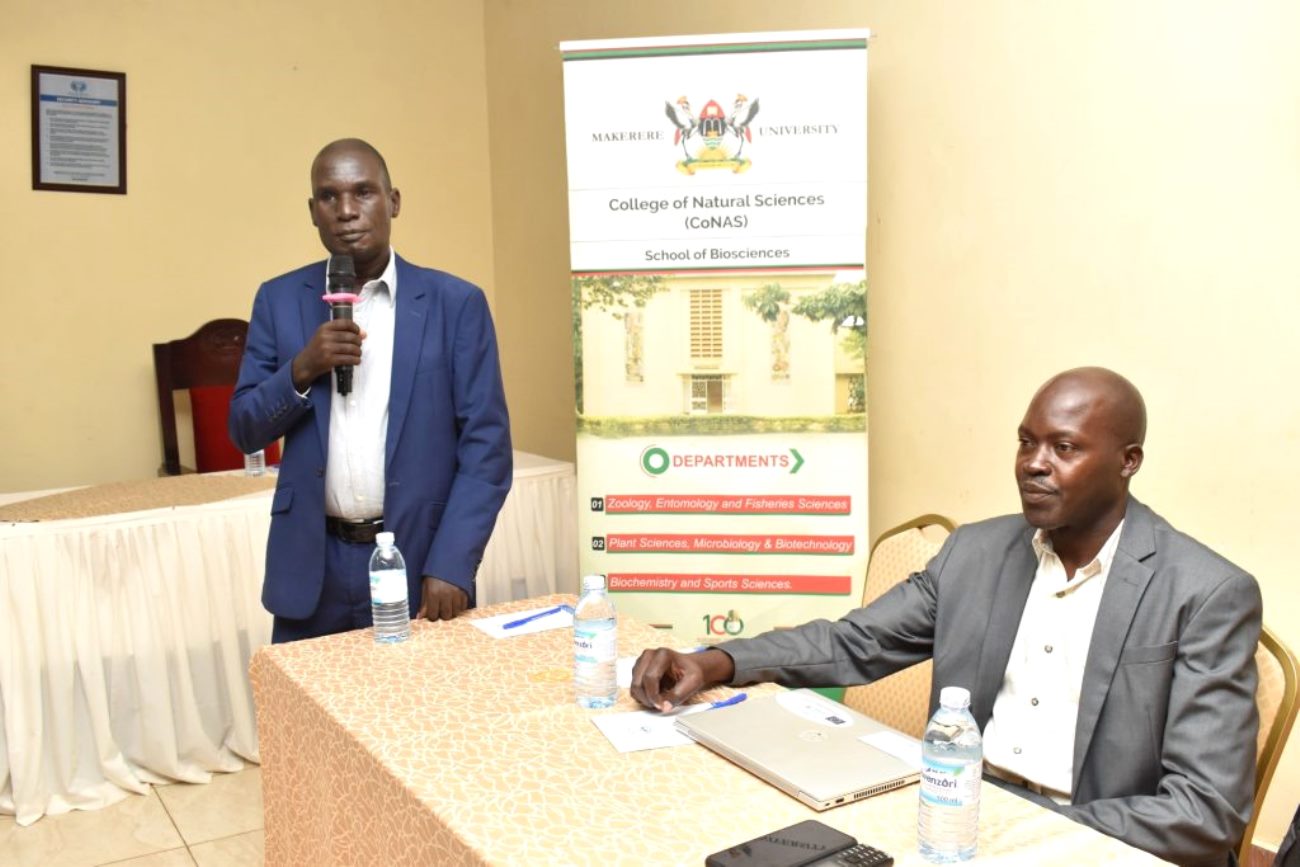
****Through a project titled, “Adding value to agro/bio-waste through integrating technologies to enhance sustainable agro-process waste management in Uganda”, the researcher led by Dr Joseph Kyambadde from the Department of Biochemistry and Sports Science, have proposed a number of technologies that can be used to avert the challenge of poor waste management in the country.
Background
Majority of industries in the country such as dairies, abattoirs, breweries, distilleries, and tanneries are engaged in agro-processing. Such industrial processing often leads to the discharge of large quantities of organic-rich wastewater, disease-causing micro-organisms, and greenhouse gas emissions, if poorly treated or managed. While the regulatory body, the National Environment Management Authority (NEMA) requires that all industries should efficiently treat their effluent to meet discharge standards, waste treatment technology market surveys that were carried out in the major industrial cities of Kampala, Jinja, Masaka and Mbarara in 2018 showed that most agro-process industries do not treat their wastewater. Furthermore, very few have in there effluent treatment management, resource recovery processes such as bio-digesters for recovering biogas and nutrient-rich bio-slurry. The industries that attempt to treat their effluent mainly use conventional systems, such as settling tanks and lagoons that do not efficiently remove all waste components. Additionally, industries require energy for their operations, but many use non-renewable sources, such as wood fuel, contributing to deforestation and greenhouse gas emissions. Consequently, the agro-process industries pollute the environment, contaminate drinking water sources, and pathogens from their wastes contribute to cases of diarrheal diseases. The agro-processing sector urgently needs technology solutions that would meet national environment regulatory requirements at affordable costs, but also incorporate resource recovery and reuse to protect the environment and also enhance their profit margins. However, many industries lack cost-effective technologies to convert their wastes into biogas or other useful by-products such as slurry for use as manure/bio-fertilizers. The industries also lack expertise to design and operate appropriate waste treatment technologies.
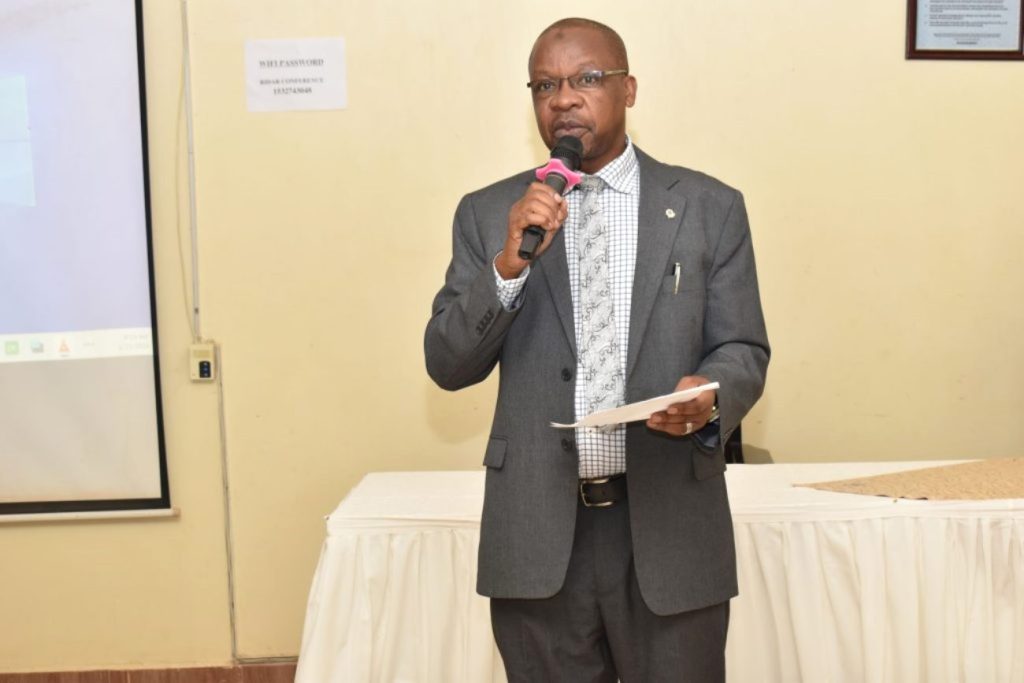
Addressing the challenge of poor waste management
Agro/bio wastes are organic-rich, hence can be biodegraded using appropriately designed integrated technologies. These methods offer the options for meeting national discharge standards, reuse of treated effluent, and recovery of useful by-products. A study conducted by researchers from the College of Natural Sciences (CoNAS), Makerere University in collaboration with partners in the waste management sector proposes a number of technologies that can be deployed to effectively address the challenge of waste in the country. These include; anaerobic-aerobic digesters, sludge drying beds, constructed wetlands, and duckweed growing units.
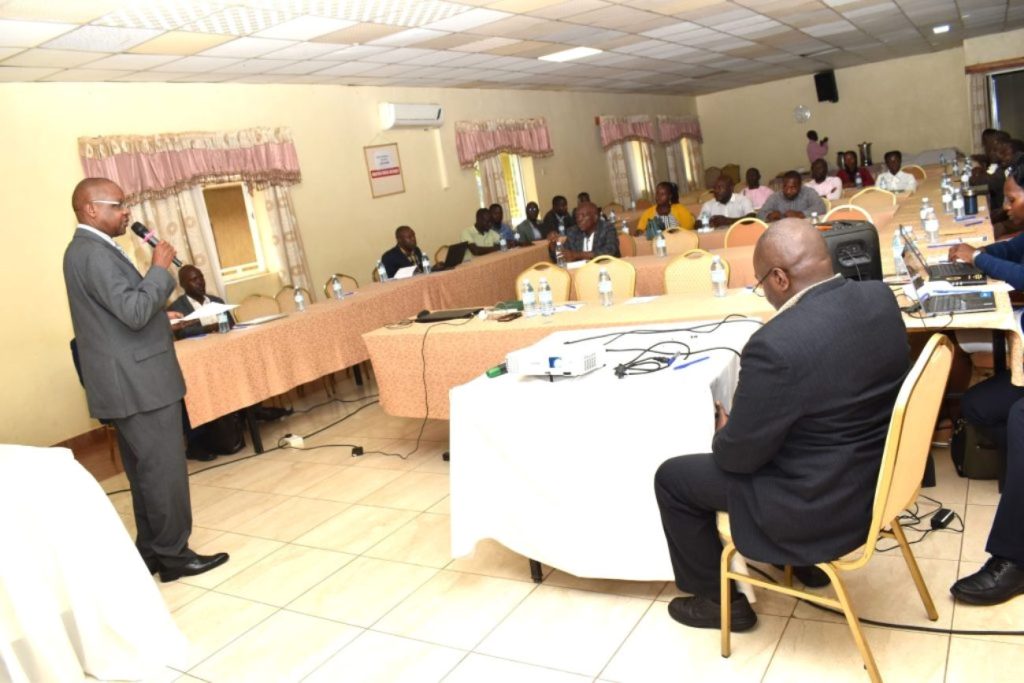
Through their project titled “Adding value to agro/bio-waste through integrating technologies to enhance sustainable agro-process waste management in Uganda”, the researchers led by Dr Joseph Kyambadde from the Department of Biochemistry and Sports Science at Makerere made several recommendations towards waste management in the country. The researchers called for integration of aspects of the technology, encompassing wastes-to-energy courses/topics in the curricula of programmes like biochemistry, industrial chemistry, and environmental sciences at universities. This would enable training of scientists who would in turn foster adoption and promotion of the developed technologies in different industries. They also emphasized the need to promote investment in technologies that can be used to convert waste into useful by-products like biogas, bio-fertilizers and protein-additives, and to raise awareness about the importance of waste treatment technologies amongst private-public actors, managers/business owners of agro-processing industries, as well as government line ministries/agencies, and development partners.
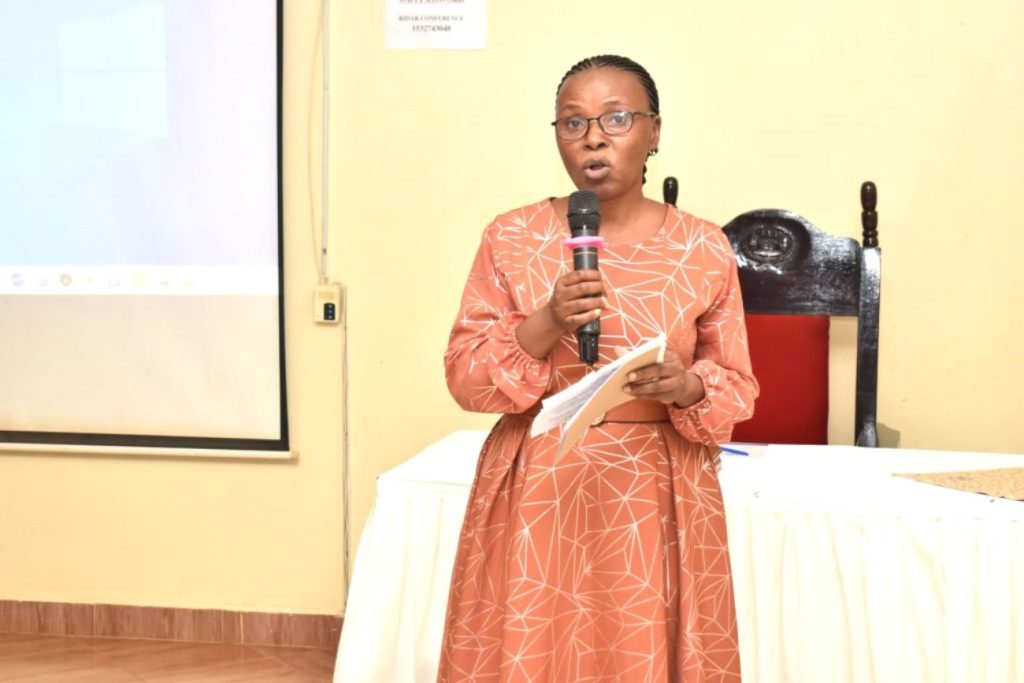
Supported by the Government of Uganda through the Makerere University Research and Innovations Fund (Mak-RIF), the overall objective of the project was to contribute to climate change mitigation, environmental sustainability, and agricultural development through integrated waste management systems. Under the project, the research team developed nutrient-rich fertilizer and animal feeds, and supported the production of biogas and electricity. Other members on the project included; Dr. Robinson Odong (Co-Principal Investigator), Dr. Gertrude Muwanga (Economist), Eng. Charles Ddungu (Civil Works), Eng. Edward Kalule (Electricals), Mr. Bright Twesigye (Research Assistant), Mr. Sendi (Field Assistant), Mr. Kuman (Field Assistant), and CATDA (Project Host).
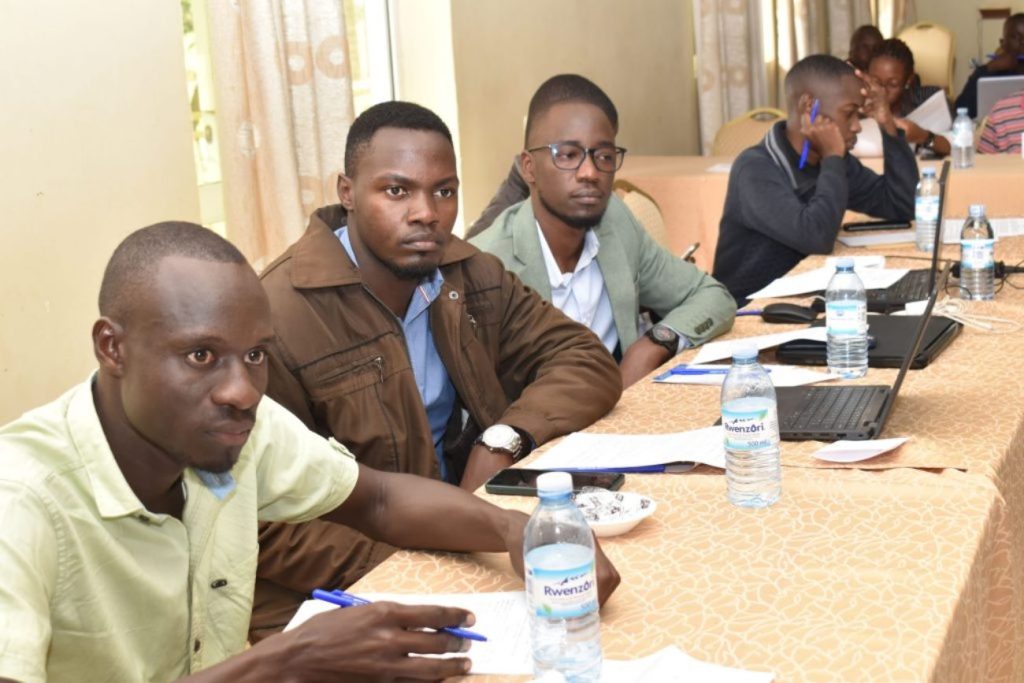
Research dissemination seminar
On 23rd January 2024, the project team held a seminar at Ridar Hotel, Mukono District to present their research findings/outputs to key stakeholders in the waste management sector such as industry, academia, and policy makers, and also receive feedback. At the meeting, the project PI, Dr. Joseph Kyambadde decried the high level of poor waste disposal in the country. Highlighting the support extended to City Abattoir Traders Development Association (CATDA), Dr Kyambadde said many industries were directly disposing effluent into water sources, posing a number health, environmental and economic risks. “Investing in waste treatment technologies would avert the risks, but also support the recovery of useful byproducts such as nutrient-rich slurry or biogas.” As one of the achievements registered, the project supported the construction of a wastewater treatment plant at Kampala City Abattoir. According Mr. David Mutebi, the PRO of Kampala City Abattoirs Hides and Skin Traders’ SACCO, before Makerere supported the construction of the plant, effluent used to be discharged in Nakivubo Channel, posing several health and environmental risks. Dr Kyambadde appreciated the Government for supporting the project which is envisaged to minimize poor waste disposal throughout the country.
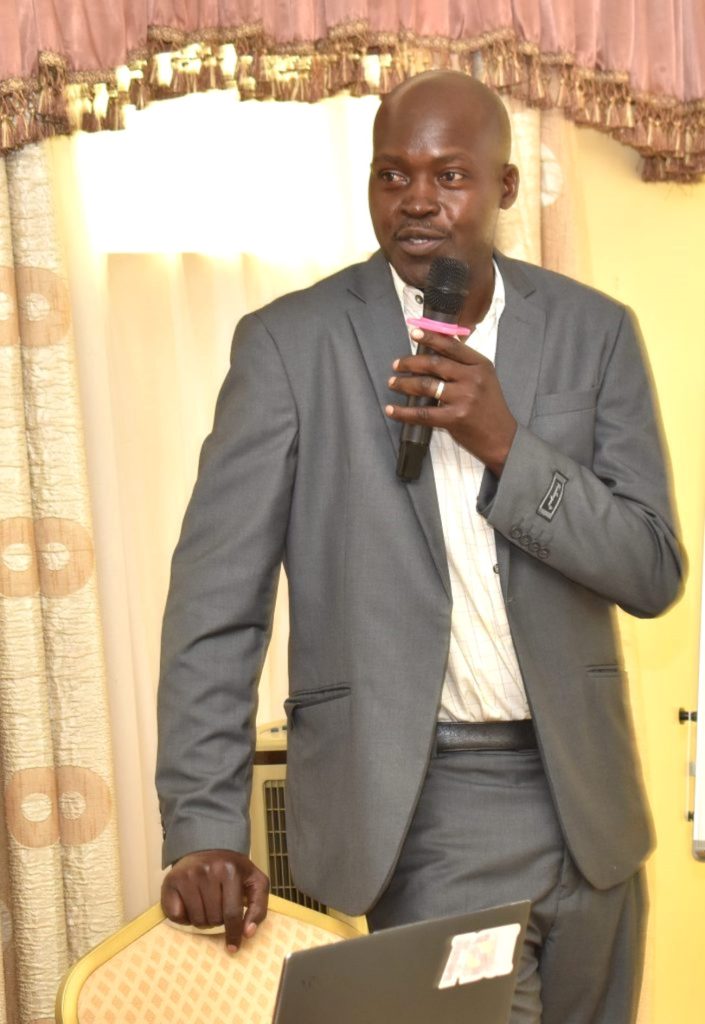
As part of the strategies for sustainable agro-process waste management in the country, participants advocated for a comprehensive policy, a waste management fund, and incentives for investment in waste management technologies. They also called for a comprehensive curriculum for waste management, and a market development plan for waste products.
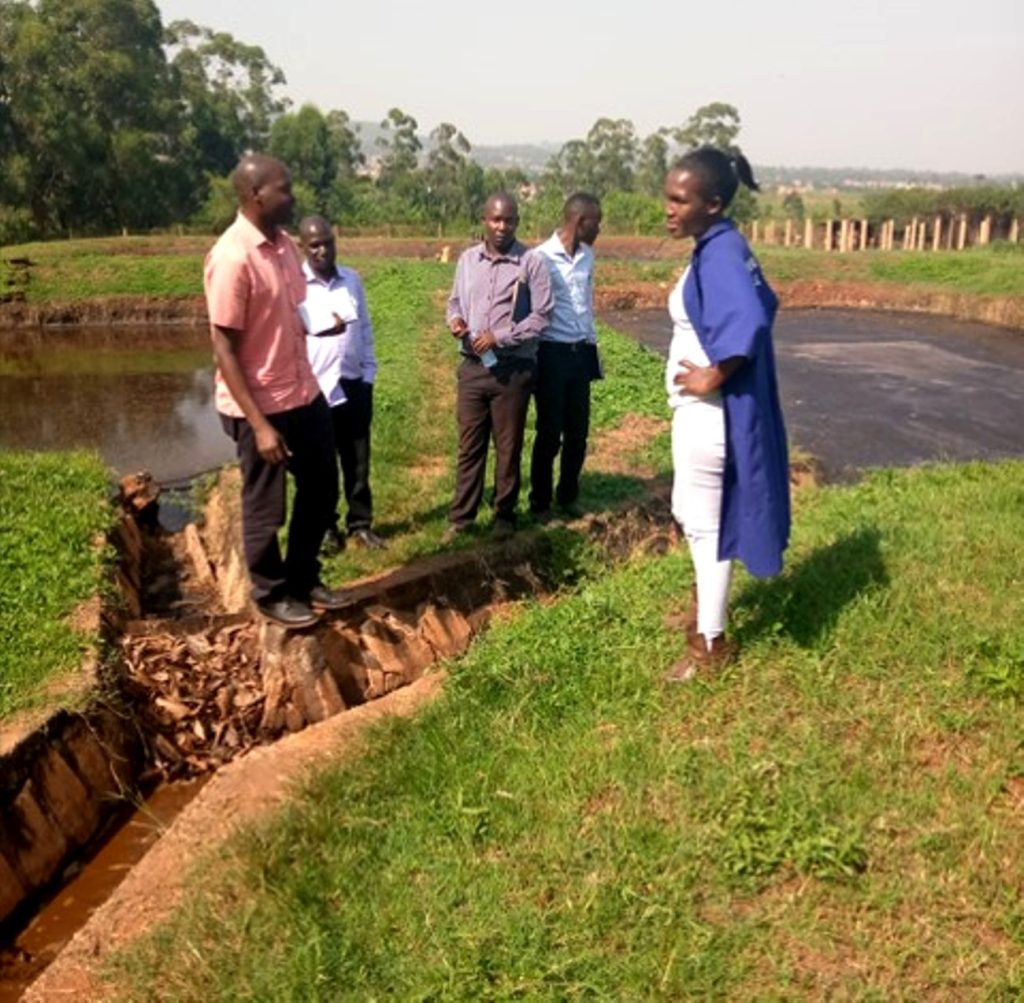
In his remarks, the Deputy Principal of CoNAS, Prof. Juma Kasozi appreciated the Government of Uganda for the support extended to the project. “Poor waste disposal is one of Uganda’s biggest challenges. I commend the research team for venturing into research that directly addresses the country’s development problems.” He called for increased investment to support initiatives aimed at managing waste from industries and other places.
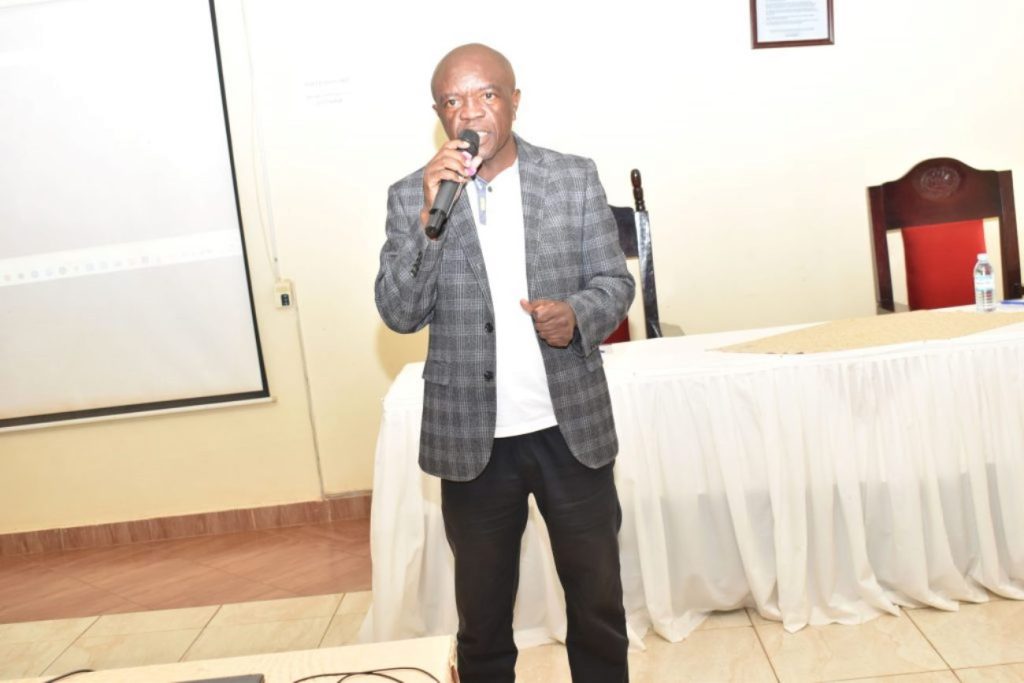
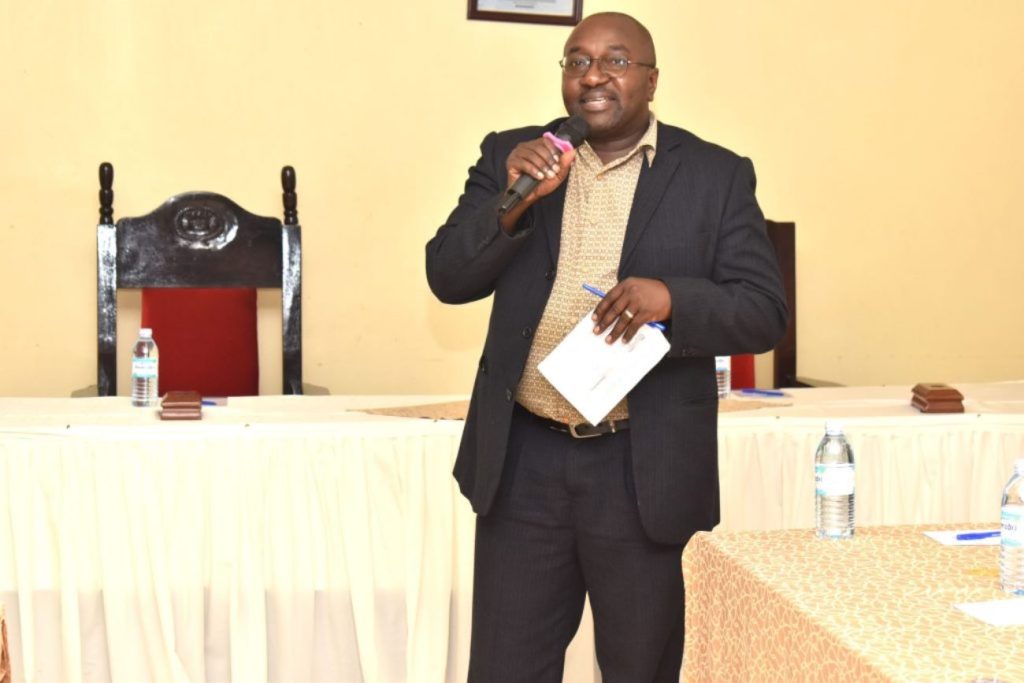
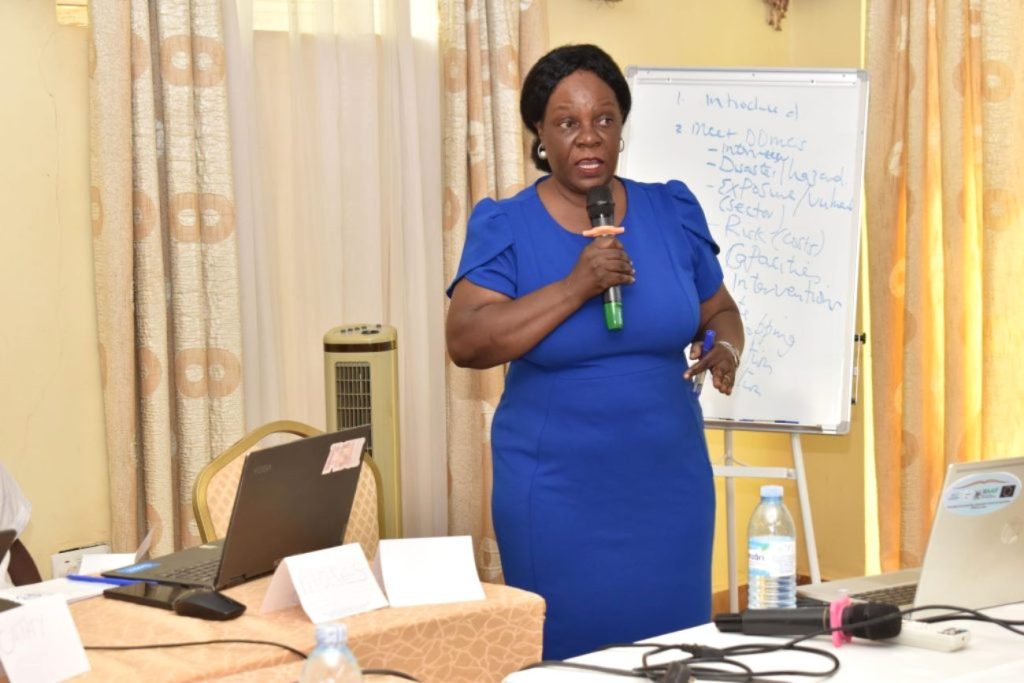
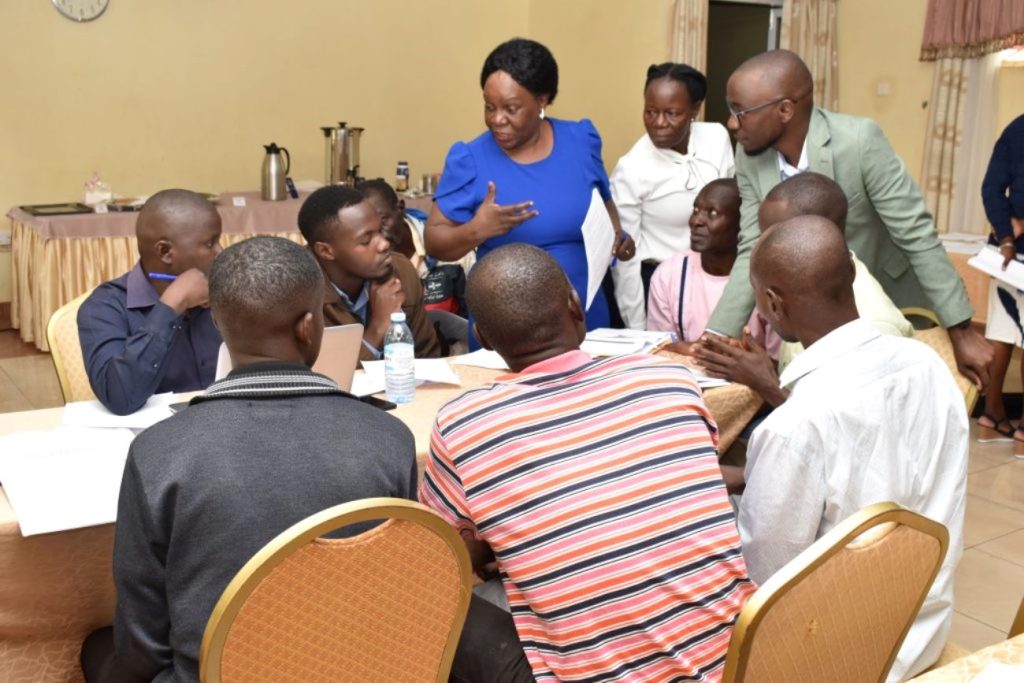
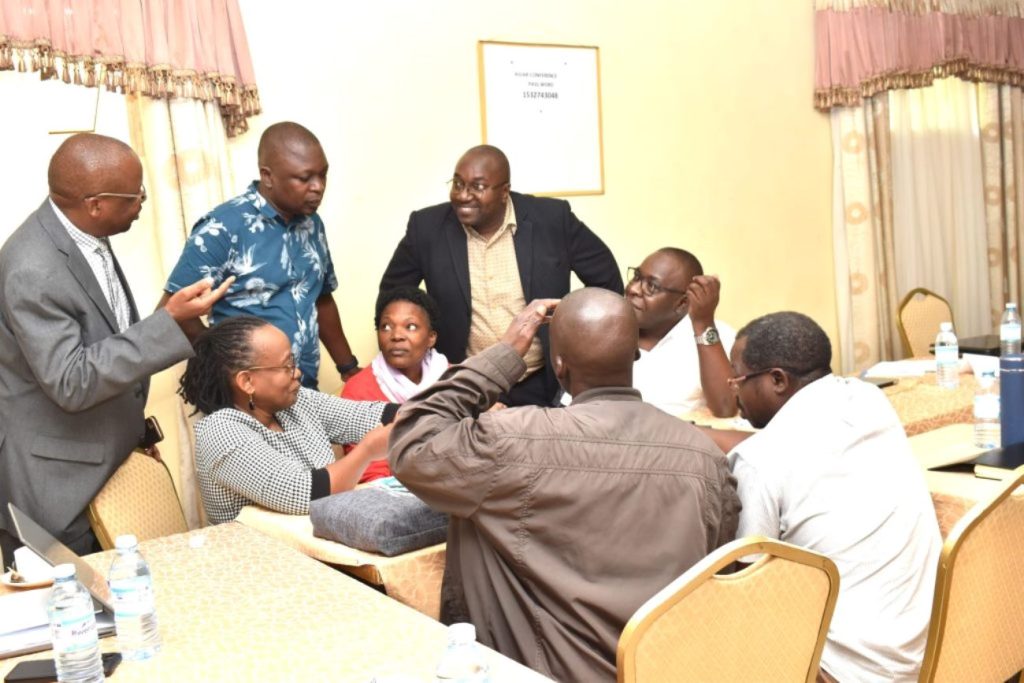
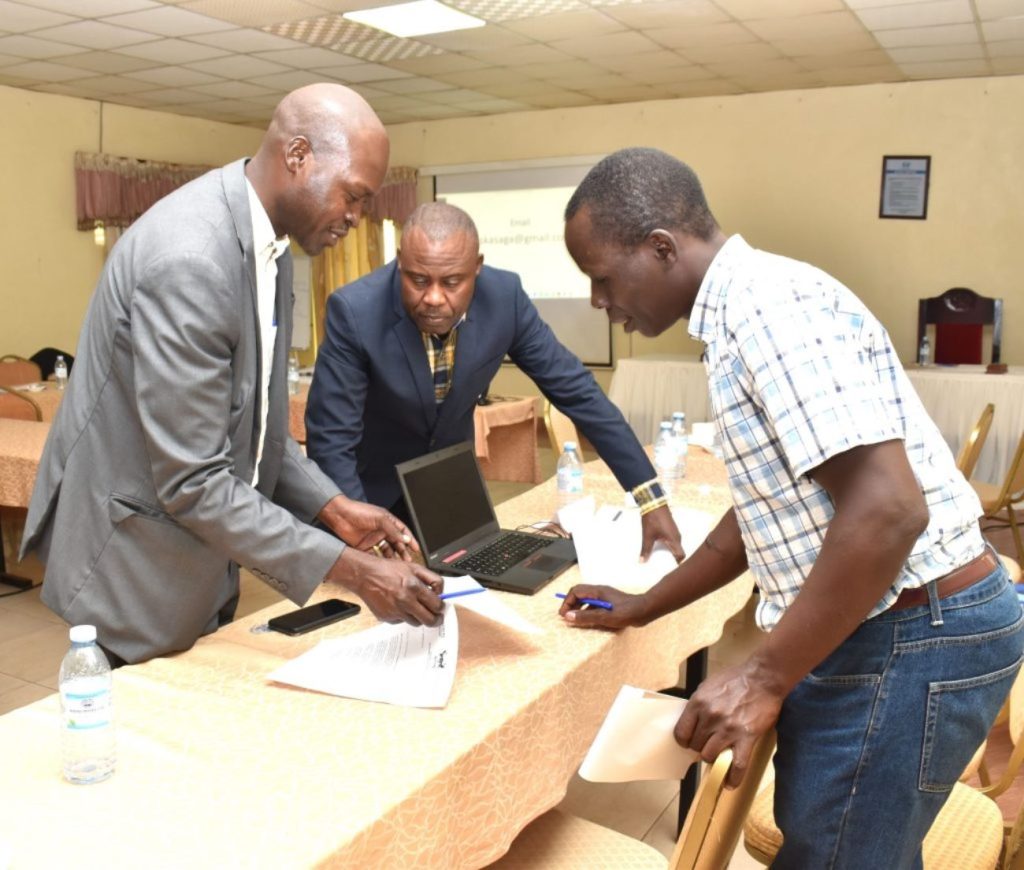
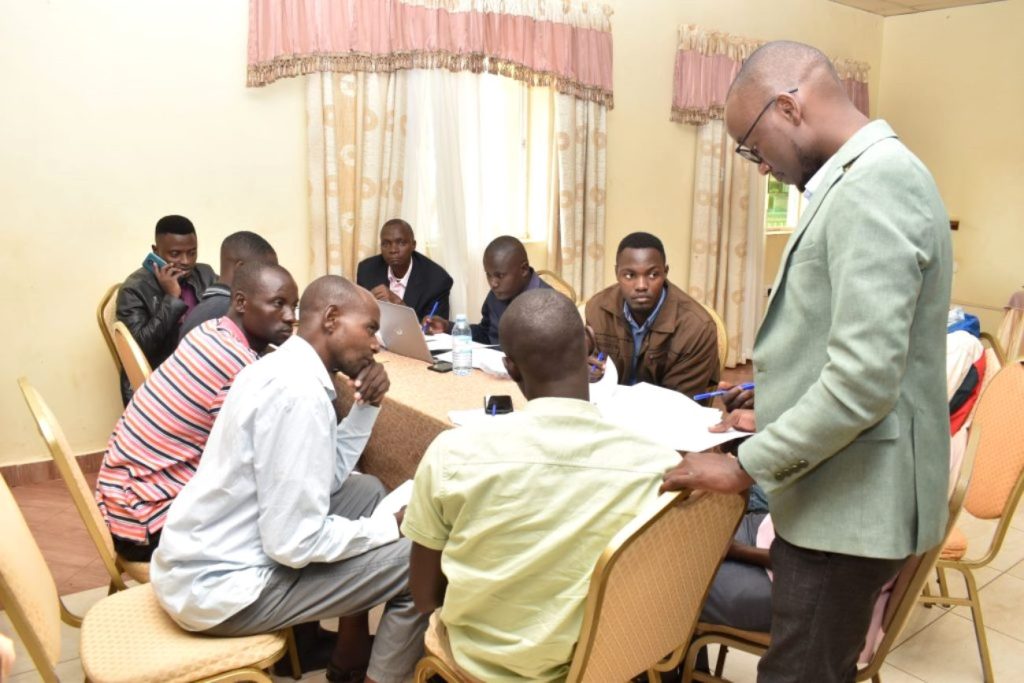
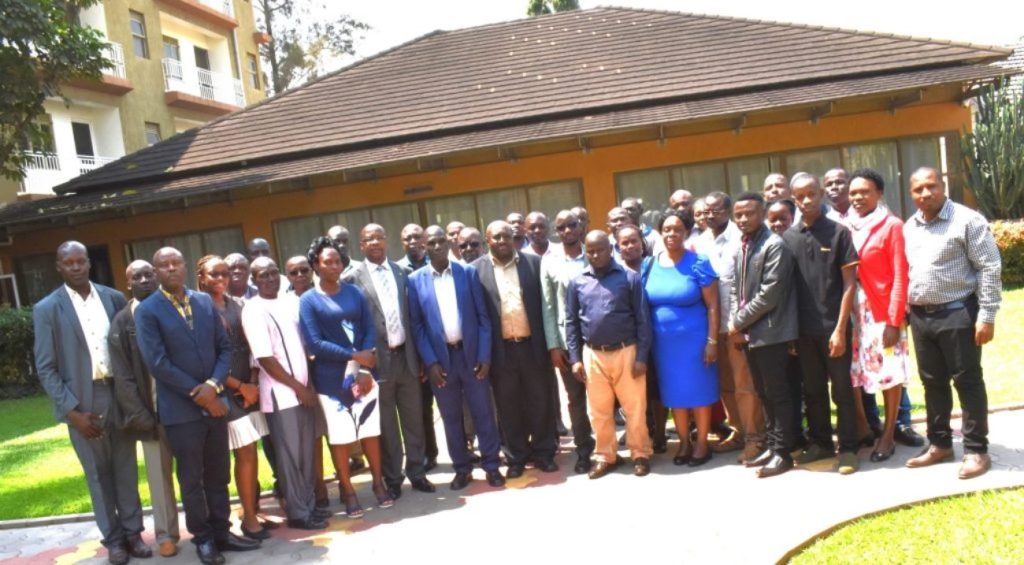
You may like
-


76th Graduation Highlights
-


Mak Selected to Host Alliance for African Partnership Africa Office
-


Meet Najjuka Whitney, The Girl Who Missed Law and Found Her Voice
-


Makerere University School of Public Health Graduates First Cohort of Cost-Effectiveness Analysis Short Course
-


Climate variability found to shape malaria trends in Yumbe District
-


Mak hosts First African Symposium on Natural Capital Accounting and Climate-Sensitive Macroeconomic Modelling
Natural Sciences
BOKU University Charts New Collaboration Strategies with Mak’s Department of Zoology, Entomology & Fisheries Sciences
Published
2 weeks agoon
February 12, 2026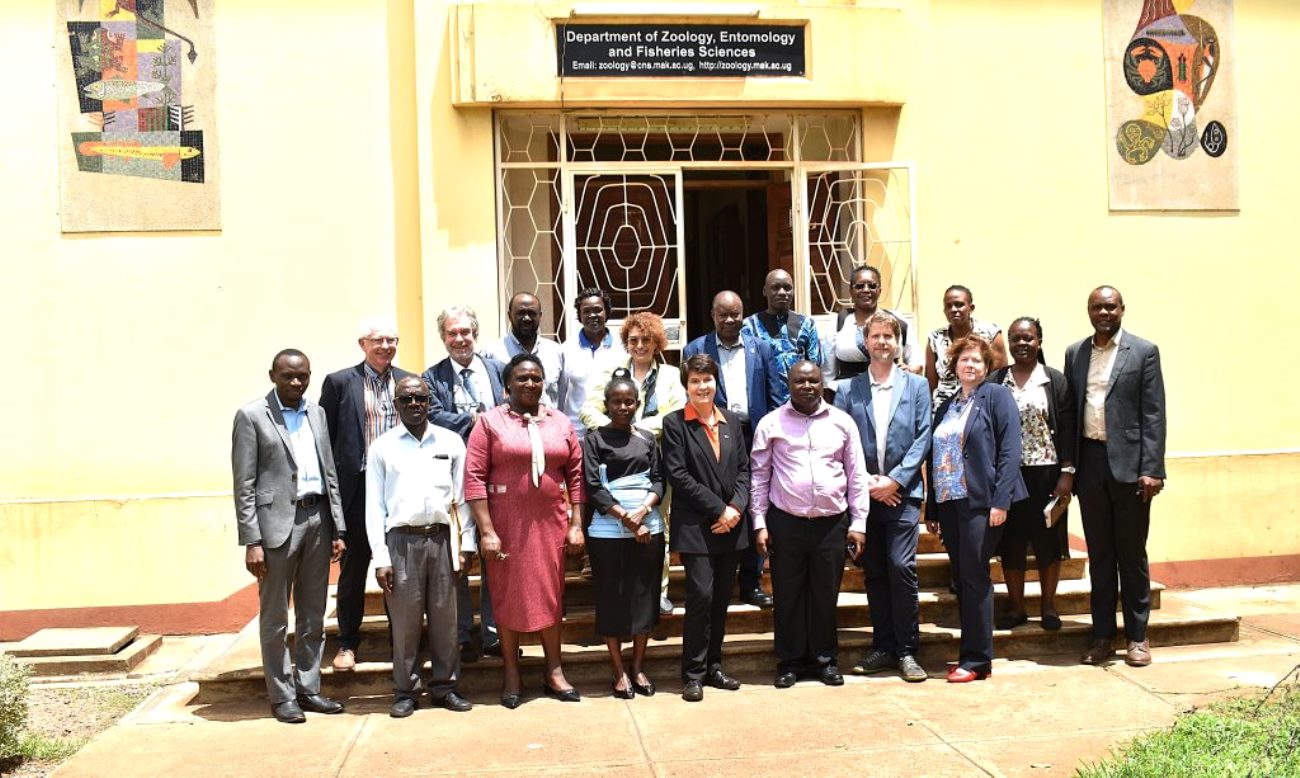
The Department of Zoology, Entomology and Fisheries Sciences at Makerere University on 11th February 2026 hosted a high-level delegation from the University of Natural Resources and Life Sciences, Vienna (BOKU), to discuss strategies for future collaboration in a partnership that has spanned five decades.
The meeting followed the BOKU team’s participation in the opening ceremony of the Promotion of Hybrid Renewable Energy Systems towards Electricity Access in Uganda project, an initiative designed to expand access to decentralized renewable energy solutions. The project, implemented under CEDAT, is funded by the Austrian Partnership Programme in Higher Education and Research for Development (APPEAR), a programme of the Austrian Development Cooperation administered by OeAD.
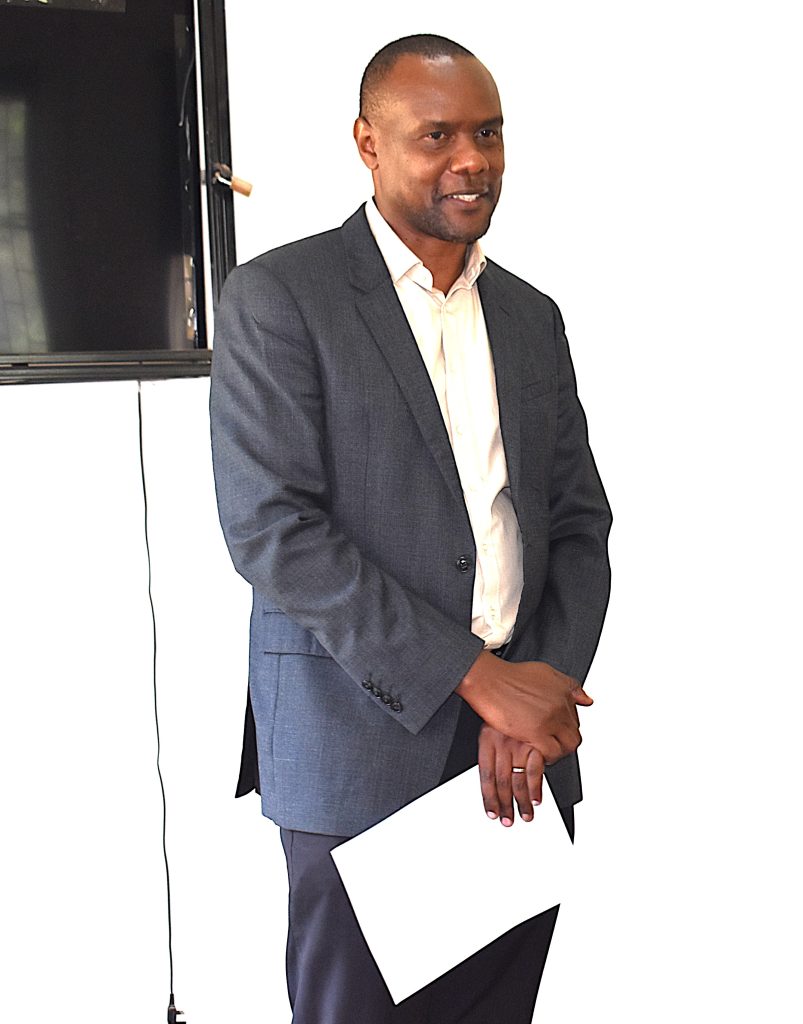
Discussions at the Department of Zoology, Entomology and Fisheries Sciences focused on deepening and broadening a historic collaboration that has shaped aquatic sciences, fisheries research, and environmental management in East Africa for half a century.
A Partnership Rooted in Limnology
The collaboration between Makerere University and BOKU traces its origins to 1975 with the establishment of the International Post-Graduate Course in Limnology (IPGL) by the late Heinz Löffler (1927-2006). The eight-month UNESCO-supported course, hosted in Lunz, Mondsee and Vienna, was designed to train scientists from developing countries in limnology – the study of inland waters.
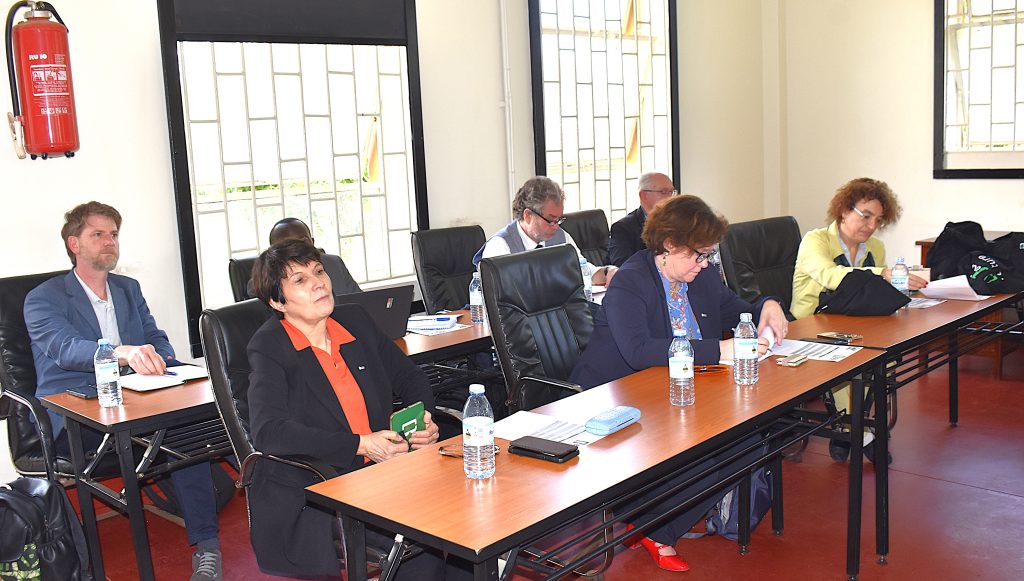
In 1976, Dr. Gwahaba James Joshua of Makerere’s Department of Zoology, Entomology and Fisheries Sciences became the first beneficiary from the university. Two years later, Boniface Makanga attended the UNESCO course and went on to initiate a Marine Practical Course to the Indian Ocean in 1993. That programme has since grown into over 30 years of annual field activity in Mombasa, benefiting undergraduate and master’s students and strengthening hands-on marine science training at Makerere.
Over time, IPGL evolved into a vibrant International Joint Degree Master’s Programme in Limnology and Wetland Management. The programme has built capacity for 123 aquatic professionals – 56 female and 67 male, including 20 from Makerere University. Notably, 11 dedicated limnologists are currently based within the Department of Zoology, Entomology and Fisheries Sciences, a testament to sustained capacity development.
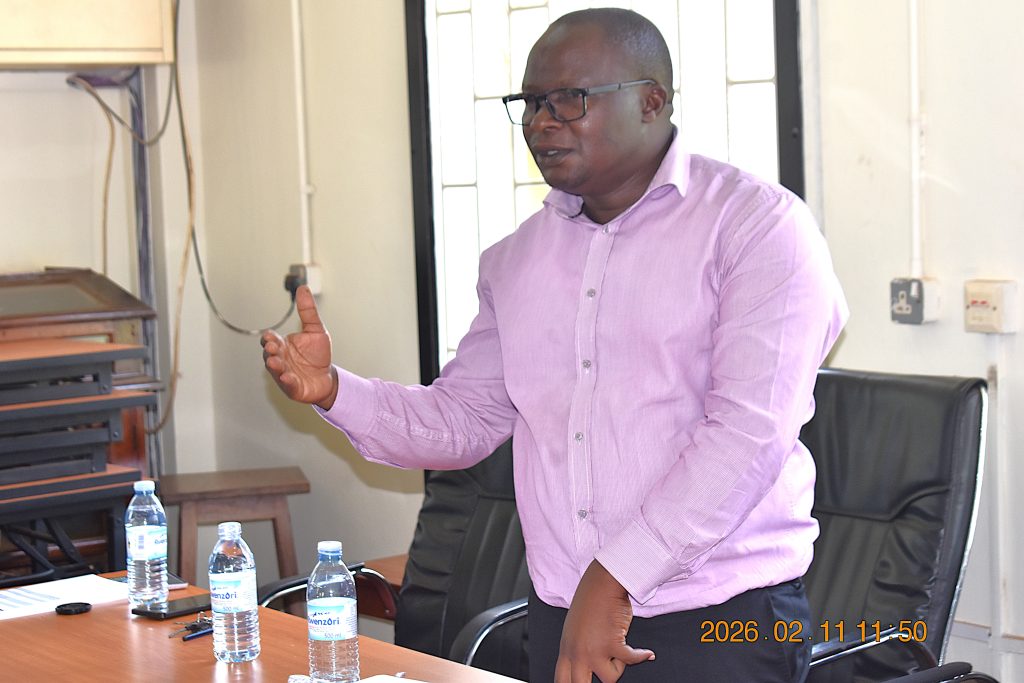
Expanding into Fisheries, Aquaculture and Regional Networks
The Mak-BOKU collaboration progressively expanded beyond limnology into fisheries, aquaculture, and broader freshwater ecosystem management.
Among the key initiatives was STRECAFISH (2015-2018), which focused on strengthening regional capacity in fisheries and aquaculture research and training to improve food security and livelihoods in Eastern Africa. The programme adopted a modular approach, trained 28 MSc students, supported five full PhDs and 11 MSc research projects, and facilitated 14 staff exchanges.
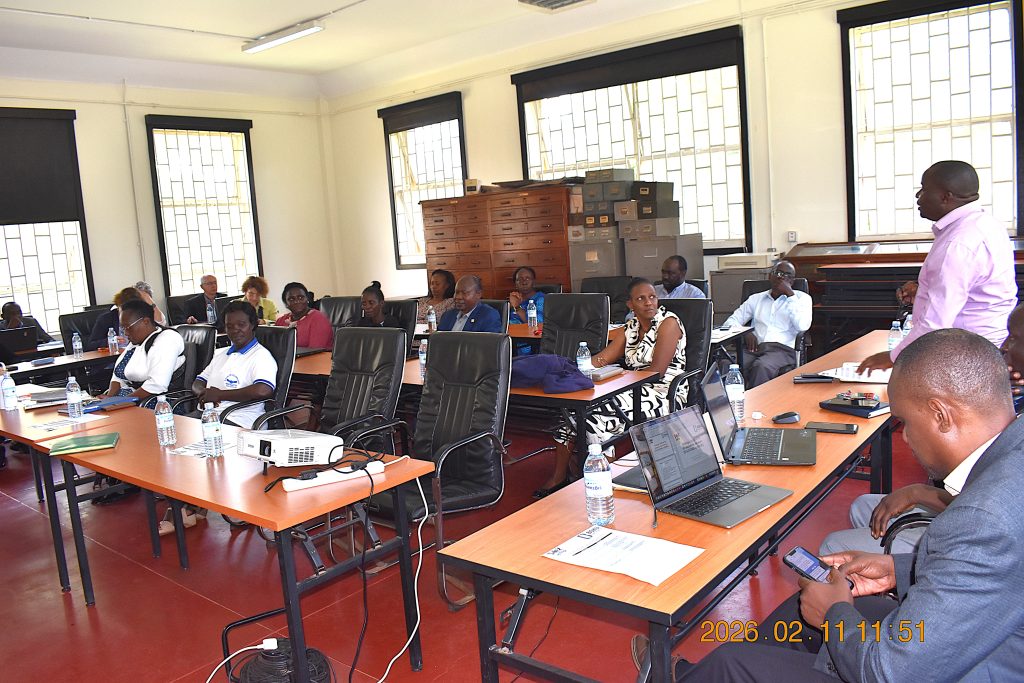
This momentum continued under COTRA (Collaborative Training in Fisheries and Aquaculture in East, Central and Southern Africa) from 2017 to 2023. COTRA enhanced staff and student mobility, supporting 24 master’s students (six credit-seeking and 18 degree-seeking), 12 doctoral candidates (four credit-seeking and eight degree-seeking), and 10 faculty and administrative staff. The initiative emphasized fit-for-purpose PhD training in aquaculture and fisheries to address food security challenges in Sub-Saharan Africa under the ACP-EU Cooperation Programme in Higher Education (EDULINK II), in partnership with institutions such as Lilongwe University of Agriculture and Natural Resources.
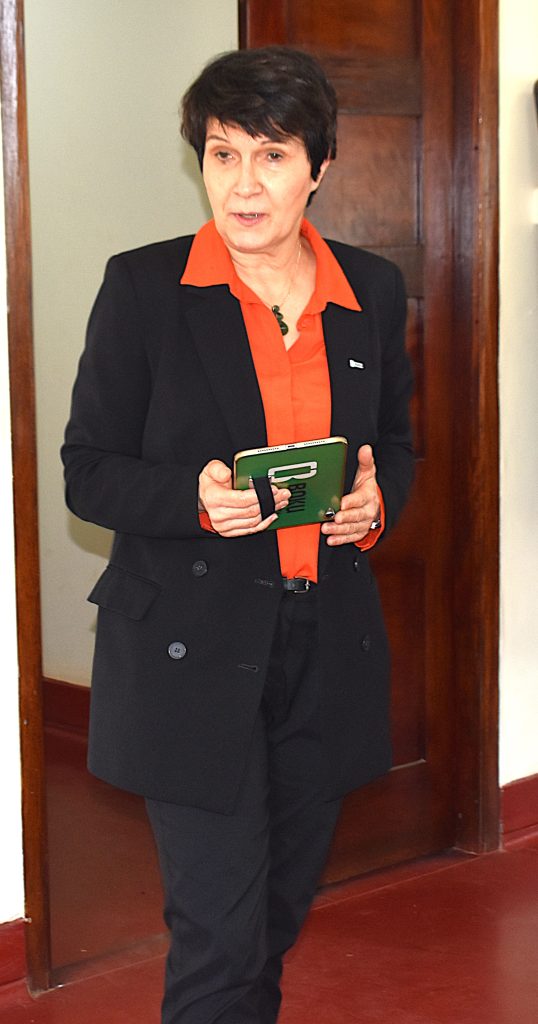
Ongoing collaborations include the Erasmus+ KA1 Learning Mobility of Individuals programme (2021-2027), which connects BOKU and Makerere with Egerton University, Kyambogo University, Addis Ababa University, Bahir Dar University and others. Additional joint initiatives include:
FreshNet: A higher education and research network for sustainable management of freshwater ecosystems in Eastern Africa, involving BOKU, Egerton University, Addis Ababa University, Bahir Dar University, EIAR and IHE Delft.
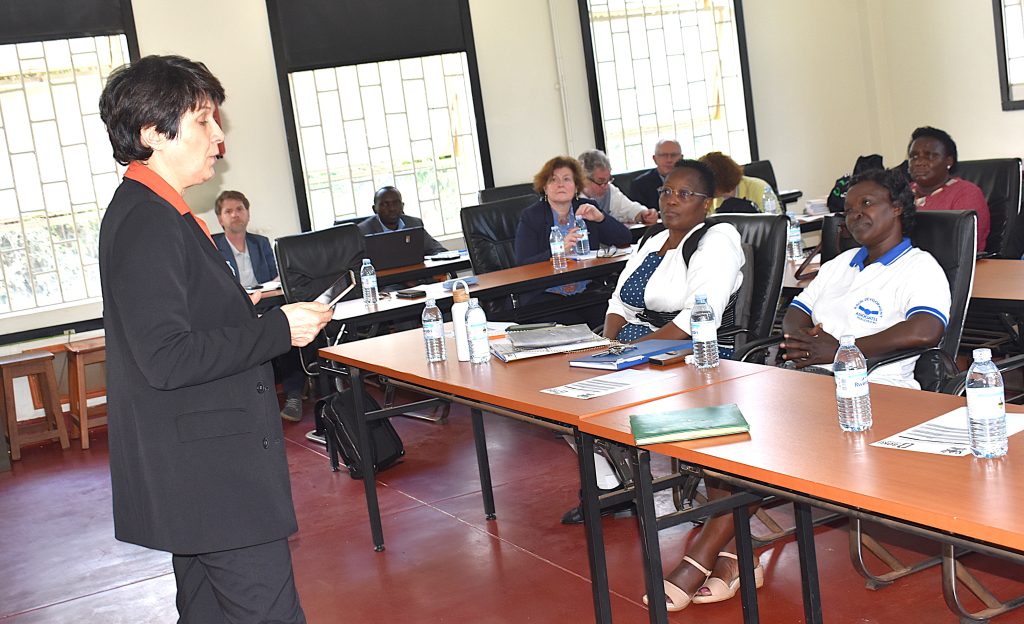
SWAQ-Uganda (2021-2026): Sustainable water quality management supporting Uganda’s development ambitions, implemented with IIASA, BOKU and Uganda’s Ministry of Water and Environment.
BIOGOLD (2024–2027): A project on biosorption for sustainable small-scale gold mining in Uganda, involving Kyambogo University, Makerere University, Gulu University, the University for Continuing Education and the University of Pretoria.
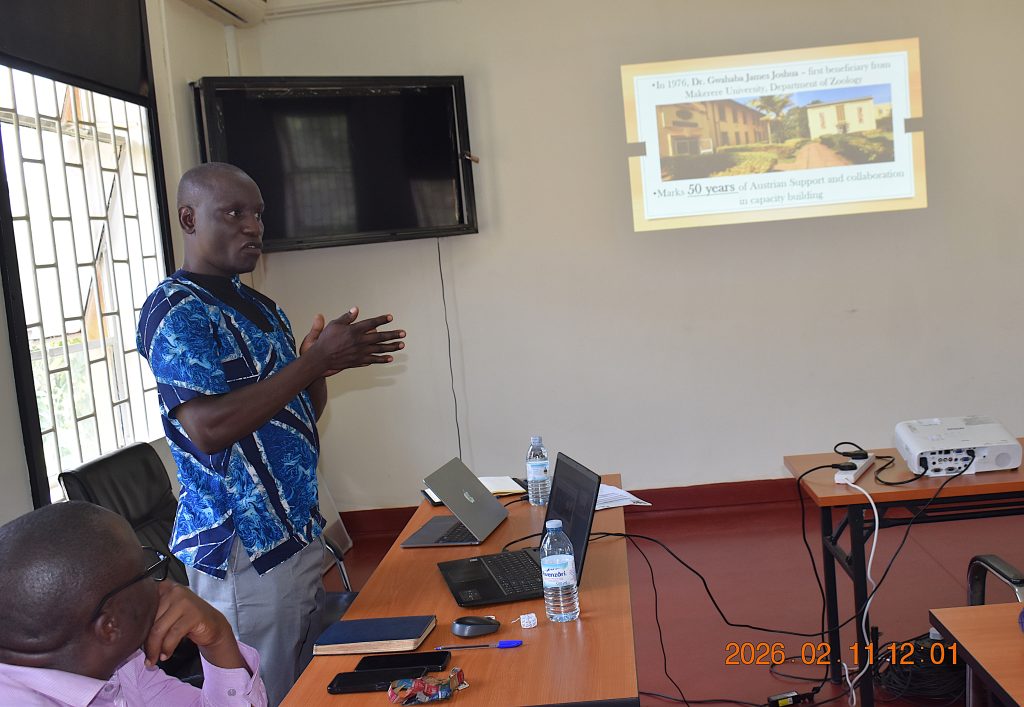
Collectively, these initiatives underscore a 50-year-old partnership that has built critical human resources at MSc and PhD levels in aquatic ecosystem management, conservation and utilization. The collaboration has also facilitated acquisition of essential research equipment, strengthened administrative capacity in project management, and nurtured a culture of knowledge sharing and innovation.
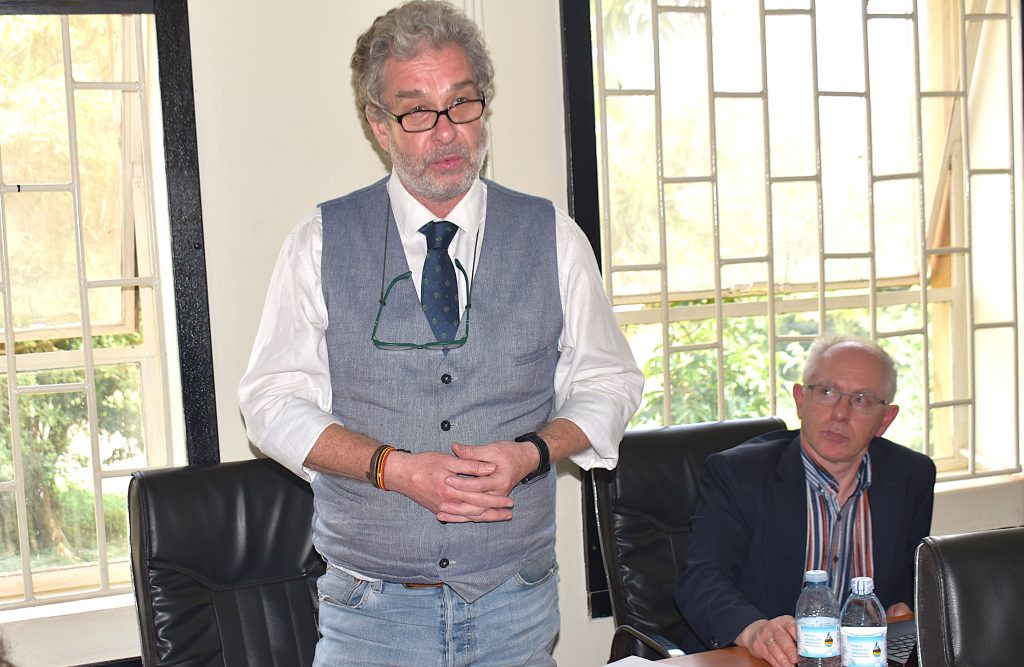
Meeting with the BOKU delegation
The BOKU delegation was led by the Rector, Prof. Eva Schulev-Steindl, a specialist in environmental law, and Vice Rector Assoc. Prof. Doris Damyanovic, an expert in landscape planning. They were accompanied by:
- Mag. Gerold Winkler, Coordinator of the Applied Limnology / Limnology and Wetland Master’s programme;
- Dr. Mathew Herrnegger, BOKU’s Africa Cooperation Country Coordinator and hydrology specialist; and
- Dr. Andreas Melcher, Africa-Uninet Coordinator from BOKU’s Institute for Development Research.
During the discussions with departmental staff, Dr. Akoll presented a detailed account of the partnership’s evolution and achievements, emphasizing its transformative impact on regional training and research capacity.
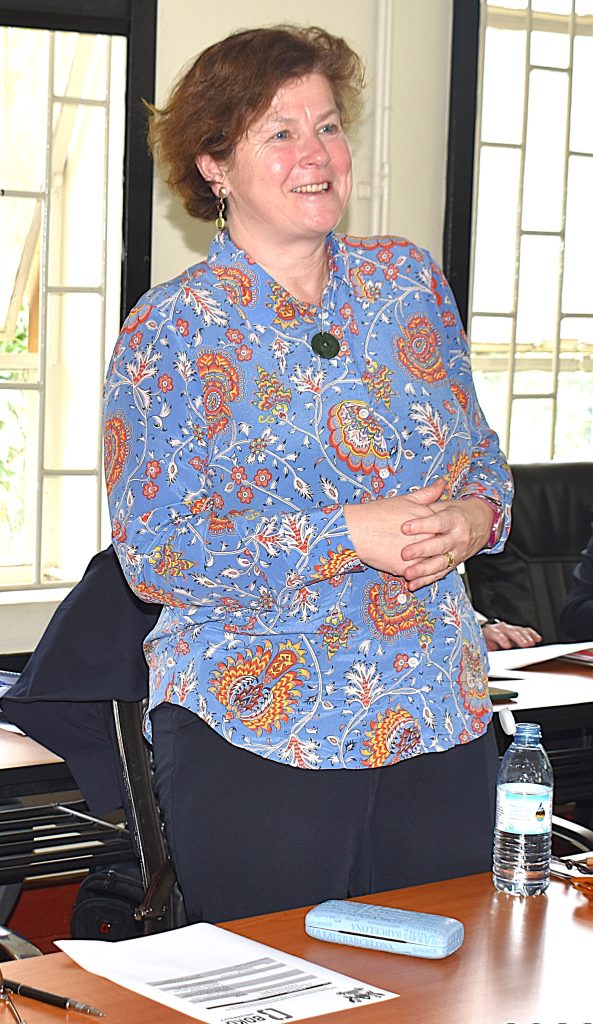
Charting the Next Chapter
As the partnership enters its sixth decade, both institutions are keen to expand into new frontiers. Key areas identified for future collaboration include:
- Enhanced staff and student exchanges;
- Joint research projects and co-publications;
- Introduction of short courses at the Makerere University Biological Field Station, Kibale beyond wildlife studies;
- Research on climate change and its effects on marine and freshwater resources;
- Advancement of basic biological research; and
- Strengthening fisheries research and innovation.
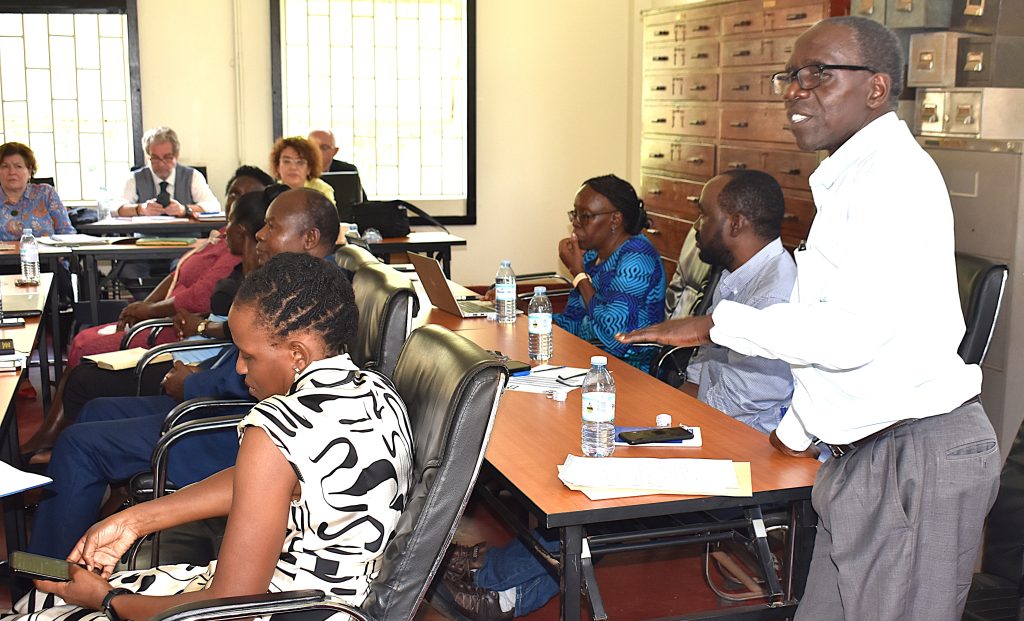
In his remarks, the Head of the Department of Zoology, Entomology and Fisheries Sciences, Dr. Godfrey Kawooya expressed gratitude for the enduring partnership, noting that it has significantly strengthened regional training capacity and supported the education of numerous Makerere staff and students. He added that the collaboration reinforces Makerere’s standing as one of the most collaborative universities globally and aligns closely with its research agenda.
Rector Schulev-Steindl reaffirmed BOKU’s commitment to advancing the longstanding relationship, describing it as a model of North-South academic cooperation built on mutual respect, shared knowledge and tangible impact.
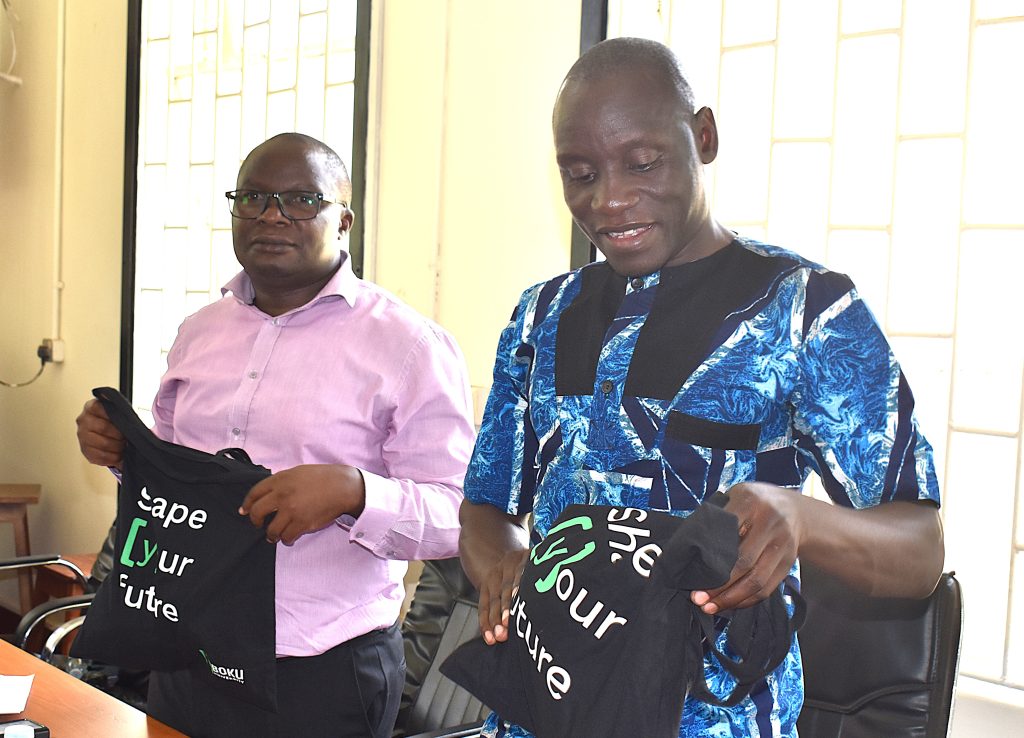
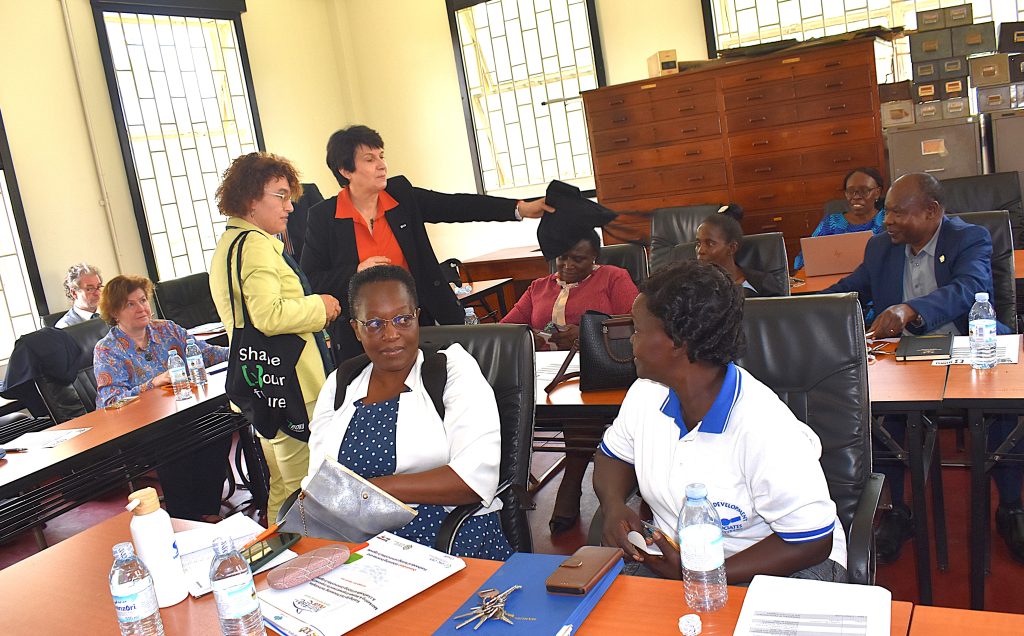
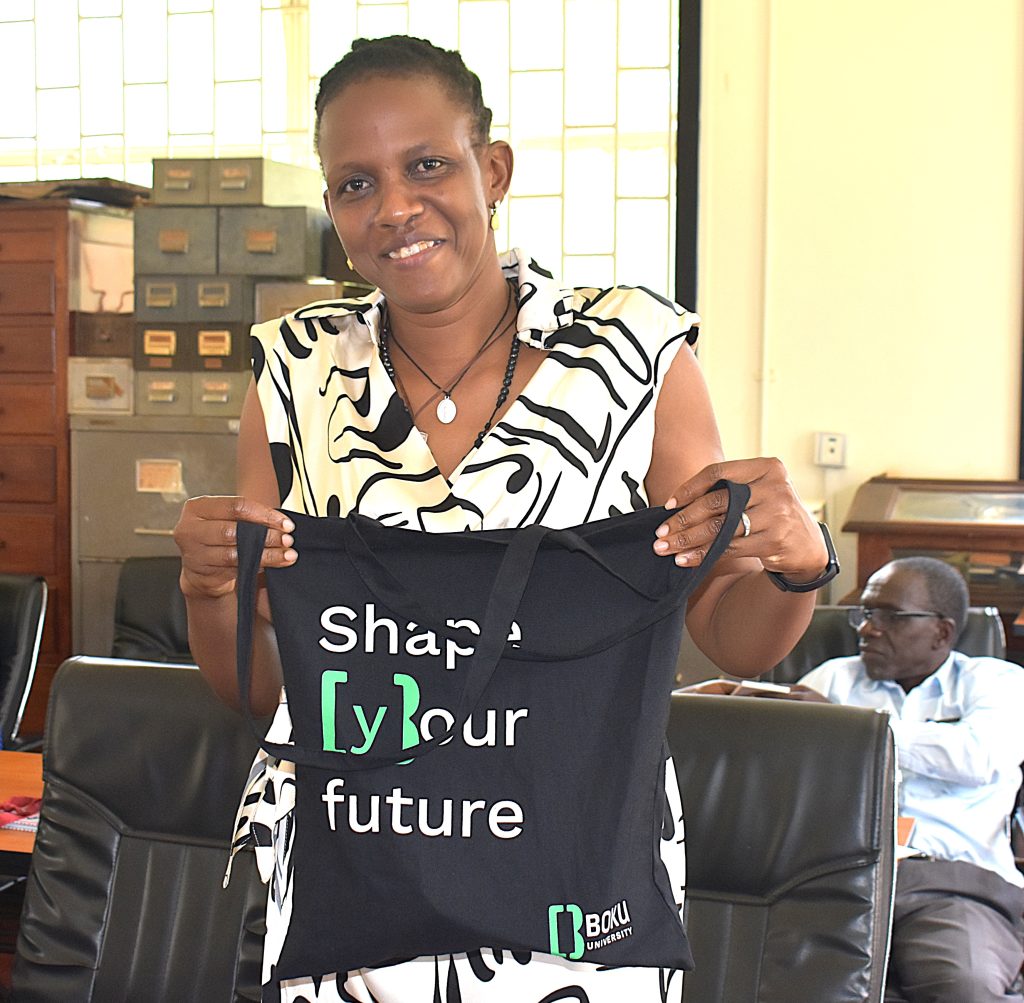
Event pictorial: https://drive.google.com/drive/folders/1HkCCZf_TCPV0V7_ZR2PSVEw1zrEGhZeJ?usp=sharing
Natural Sciences
Simon Mungudit: Mak’s Best Performing Male Science Student & Rising Star in Petroleum Geoscience
Published
3 weeks agoon
February 3, 2026
At just 24 years old, Simon Mungudit from the College of Natural Sciences (CoNAS) has etched his name in the academic history of Makerere University, having emerged as the overall best male student in the Sciences, an achievement earned through perseverance, discipline, and an unrelenting pursuit of excellence.
Mungudit is set to graduate during 76th graduation ceremony scheduled for 24th to 27th February 2026, having attained a CGPA of 4.76 in the Bachelor of Science in Petroleum Geoscience and Production. His academic interests-Reservoir Engineering, Petrophysics, and Drilling-reflect a deep understanding of the subsurface sciences that power modern energy systems.
Early Life and Journey to Academic Excellence
Born to Mr. Owor Thomas, a Game Ranger with the Uganda Wildlife Authority at Murchison Falls National Park, and Ms. Lilly Obewun Grace of Akuru Bridge Village, Nyaravur Sub-County in Nebbi District, Mungudit’s journey to academic excellence began far from the lecture halls of Makerere. At Karuma Primary School, Mungudit scored 12 aggregates in the Primary Leaving Examinations (PLE), setting the pace for his future success. He proceeded to St. Daniel Comboni College, Nebbi, where he attained 14 aggregates in 8 subjects at O’ Level. He then joined Namilyango College, one of the best secondary schools in Uganda, where he studied Physics, Chemistry, and Mathematics (PCM) and scored 19 points, results that secured him government sponsorship to pursue a Bachelor of Science in Petroleum Geoscience and Production at Makerere University.
Gratitude to his mentors and sponsors
Behind these milestones lies a story of humility, gratitude and opportunity. Mungudit credits his parents for supporting his primary and O’ Level education and expresses gratitude to TotalEnergies, which provided a full bursary for his A’ Level studies, covering tuition, upkeep, and medical care. He also acknowledges the Government of Uganda for sponsoring his university education, a factor he says motivated him to excel.
At Makerere, Mungudit thrived in an environment that blended rigorous academics with mentorship. He pays tribute to his lecturers, particularly Dr. Arthur Batte, Head, Department of Geology and Petroleum Studies, for their unwavering commitment to nurturing students and pushing them to excel.
“I always aimed to excel,” Mungudit says. “Together with a few colleagues, we formed a group and held discussions on a daily. This, coupled with a conducive study environment, prayer, and discipline, enabled us to attain excellent grades.”
Dr Arthur Batte describes Mungidit as a humble yet very intelligent student.
Achievements and Professional Experience
Beyond academics, Mungudit consistently demonstrated expertise in petroleum engineering. In 2024, he led a team that won the Reservoir Modelling Challenge, organized by the American Association of Petroleum Geologists (AAPG) Makerere University Chapter, earning prize money and a sponsored field trip to the Tilenga Project courtesy of COSL. He was First Runner-Up in the Petro Bowl competitions of 2023 and 2025, a highly competitive petroleum knowledge quiz organized by the Society of Petroleum Engineers (SPE) Uganda Section. He served as a Student Officer for the SPE Makerere University Chapter in 2023, and in 2024, he chaired the Organizing Committee of the SPE Annual Students’ Technical Conference and Exhibition, helping bridge the gap between academia and industry.
His learning extended beyond the classroom. During his internship, he worked with TotalEnergies, where he applied petrophysics skills to analyze gas-while-drilling data for formation evaluation, hands-on exposure that sharpened his professional competence. At Makerere University, he mastered PetroMod 2018, a critical software tool in oil and gas exploration. After completing his studies in June 2025, Mungudit trained with the Uganda National Oil Company (UNOC), participating in the 2D seismic acquisition in the Kasurubani Block in Buliisa and Hoima districts.
Mungudit currently works as the Special Projects Coordinator for the Society of Petroleum Engineers (SPE) Uganda Section Student Liaison Committee.
Future Plans
Mungudit hopes to work in the oil and gas industry in the upstream sector as a geoscientist. He also plans to pursue further studies in petroleum engineering.
From a village in Nebbi to the forefront of petroleum geoscience, Mungudit’s story is one of an opportunity seized and potential realized. It is a testament to what is possible when talent meets support, and when determination is guided by faith, mentorship, and service. As Uganda’s oil and gas sector continues to evolve, Mungudit stands as a symbol of the skilled, principled professionals poised to shape its future.
The CoNAS fraternity congratulates Mungudit on this noble achievement.
Natural Sciences
Enhancing Data Quality: NutriFishPlus Research Assistants Retooled Ahead of Baseline Survey
Published
1 month agoon
January 20, 2026
The NutriFishPlus Project team successfully conducted a one-day capacity-building training for its research assistants, centered on the Monitoring, Evaluation, and Learning (MEL) framework and the household survey tool. Held on 13th January 2026 at Ridar Hotel Seeta in Mukono District, the training aimed to improve data collection, analysis, and learning processes to support evidence-based project implementation and impact assessment.
It was officially opened by Dr. Jackson Efitre, the Principal Investigator, who introduced the research assistants to the overall goal of the NutriFishPlus Project and the guiding principles of the International Development Research Centre (IDRC) Scaling Approach. In his remarks, Dr Efitre emphasized the importance of high-quality data in tracking progress, informing adaptive management, and scaling impact.
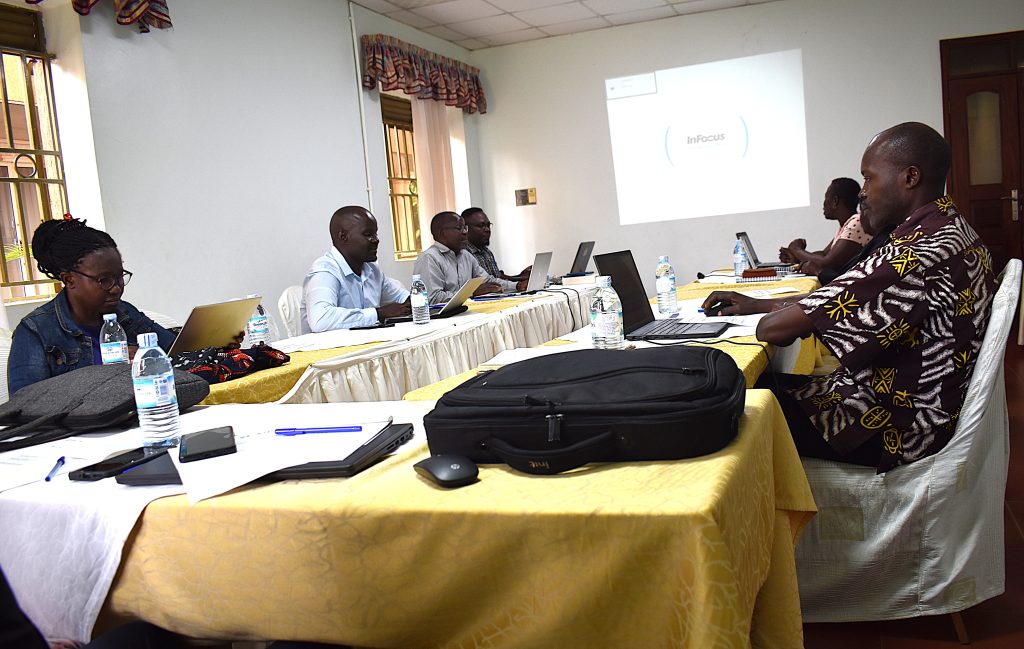
NutriFishPlus builds on the significant achievements of the ground-breaking NutriFish Project (2019–2023), which was funded by IDRC and the Australian Centre for International Agricultural Research (ACIAR) through the Cultivate Africa’s Future Fund Phase II (CultiAF2). Officially launched on 28th October 2025, the two-year and eight-month project seeks to scale proven innovations while deepening nutrition, livelihood, and gender outcomes within small pelagic fisheries.
The project aims to:
- Scale up the adoption of improved and sustainable fish processing technologies, including solar tent driers and raised racks, to reach new fishing communities across Uganda.
- Enhance market access and strengthen supply chain linkages for high-quality fish and fish-based products.
- Empower women and other vulnerable groups while strengthening community resilience through diversified income-generating activities.

Expected Outcomes:
NutriFishPlus is expected to deliver multiple socioeconomic and environmental benefits, including:
- Improved incomes and livelihoods for marginalized fishing communities, particularly women and youth.
- Enhanced health and nutrition outcomes through the development of diversified, market-embedded fish products.
- Establishment of sustainable and replicable fish processing and marketing models across Uganda and the wider East African region.
- Increased participation of women and youth in decision-making and benefit-sharing within the Small Pelagic Fishes (SPFs) value chain.
- Improved socioeconomic conditions and ecosystem health through participatory and scalable approaches.
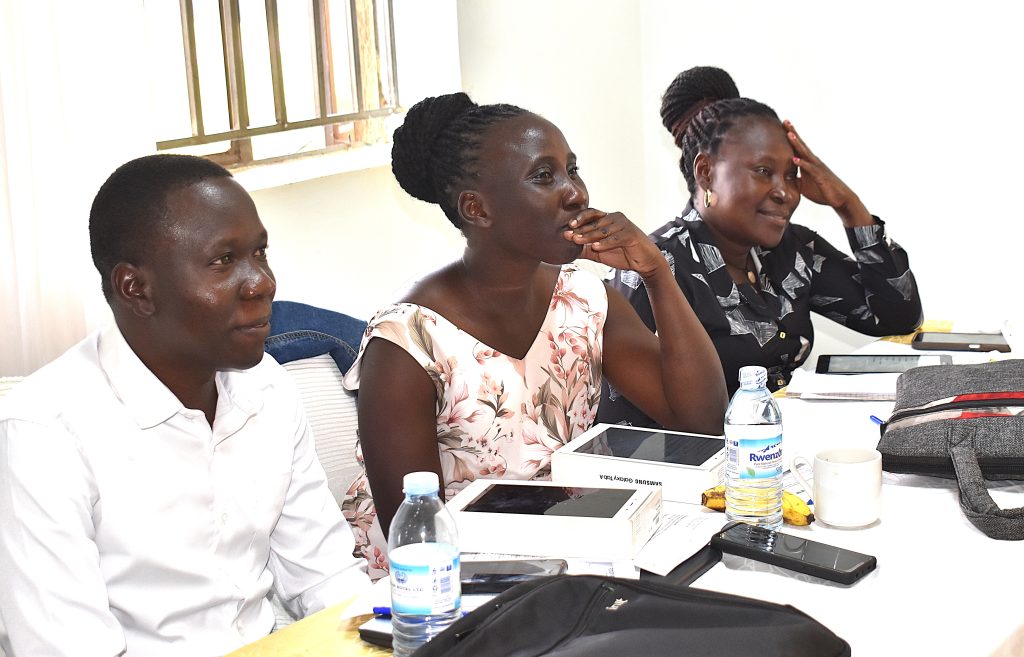
Project Implementation and Partnerships
The project is implemented by the Department of Zoology, Entomology, and Fisheries Sciences at Makerere University, in partnership with Nutreal Ltd and Kati Farms Ltd under a public-private partnership. Project activities will be carried out at five landing sites across Lakes Victoria, Kyoga, and Albert.

The project team comprises:
- Dr. Jackson Efitre (Principal Investigator)
- Dr. Dorothy Nakimbugwe (Co-PI from Nutreal Ltd)
- Ms. Lovin Kobusingye (Co-PI from Kati Farms Ltd)
- Dr. Robinson Odong (Project Officer, Department of Zoology, Entomology and Fisheries Sciences, Makerere University)
- Ms. Juliet Ogubi Nafula (M&E Expert)
- Ms. Nelly Badaru (Gender Specialist)
- Mr. Eugene Swinnerstone Miheso (IT Expert)
- Mr. Maurice Ssebisubi (Kati Farms Ltd)
- Ms. Hasifa Kabejja (Communication Officer)
- Ms. Eve Akongo Ampa (Project Administrator)
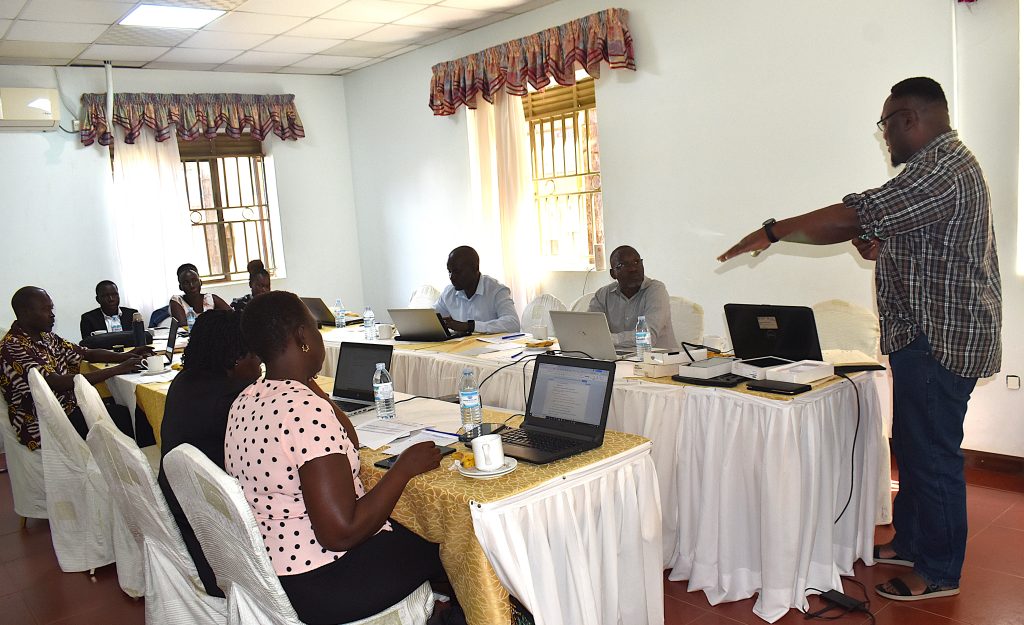
Strengthening MEL and Data Quality
During the training workshop, Ms. Juliet Ogubi Nafula guided the team through the NutriFishPlus MEL framework, highlighting its objectives, indicators, results chain, and reporting requirements. Particular emphasis was placed on the role of high-quality data in facilitating project learning, adaptive management, and accountability to donors and beneficiaries.
A key highlight of the training was a hands-on orientation to the household survey tool, led by Mr. Eugene Swinnerstone Miheso. Participants were taken through the structure of the questionnaire, which covers household demographics, nutrition and dietary diversity, fish consumption, livelihoods, value addition, gender dynamics, and food security. Practical sessions enabled the research assistants to practice administering the tool, apply effective probing techniques, and address common field-level challenges.
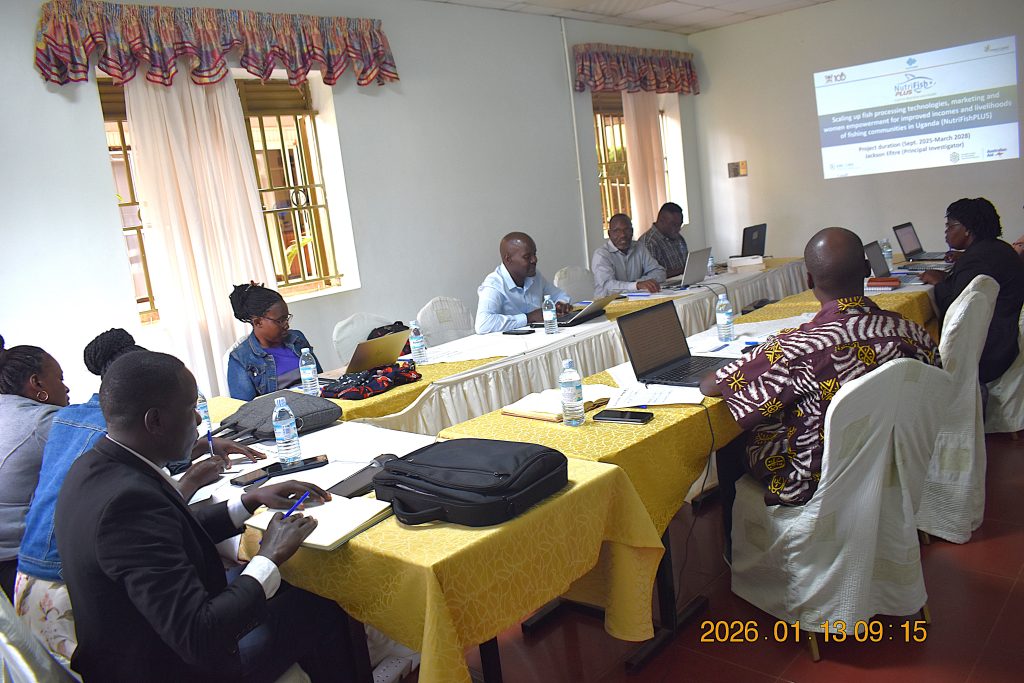
The training underscored critical ethical considerations in household data collection, including informed consent, confidentiality, and respectful engagement with respondents. Data quality assurance measures such as accurate data recording, use of digital data collection platforms, and daily review protocols were discussed to ensure consistency and reliability.
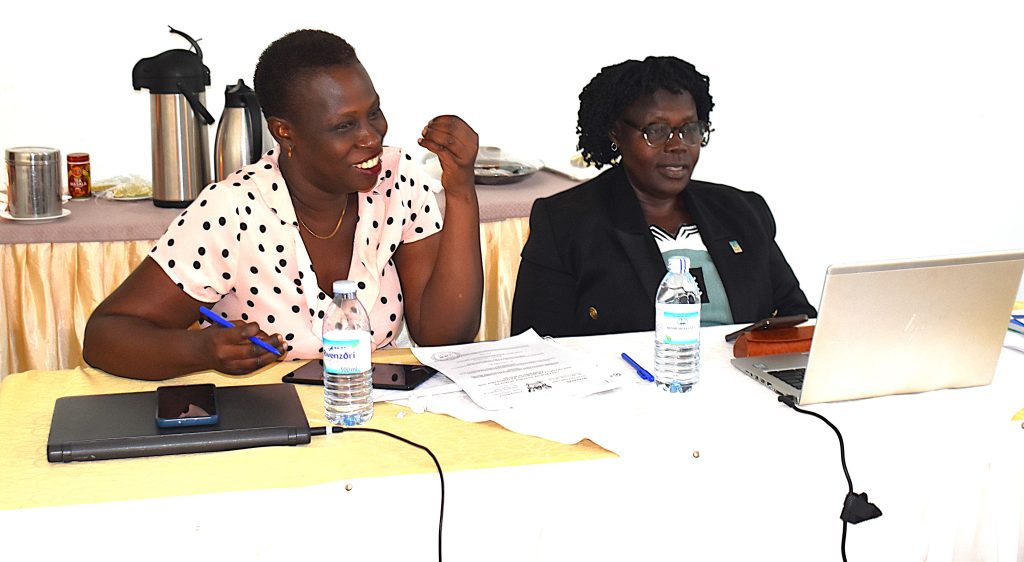
In his closing remarks, Dr. Efitre emphasized that well-trained research assistants are central to generating credible evidence that reflects the lived realities of beneficiary households. “This training is a vital investment in strengthening our MEL system and ensuring that the evidence we generate informs learning, accountability, and improved project outcomes,” he noted.

The participants expressed gratitude for the interactive and practical nature of the training, noting that the sessions significantly enhanced their confidence and readiness for fieldwork. The training concluded with a question-and-answer session and a brief assessment to confirm participants’ understanding of the MEL framework and household survey tool.

Pre-testing of the household survey tool
Following the training, the project team conducted a pre-test of the household survey tool at Kasenyi Landing Site in Entebbe on 19th January 2026, ahead of the baseline survey. The baseline data collection will be carried out across five landing sites: Katosi (Mukono District), Kikondo (Buikwe District), Bangaladesh and Kayago (Amolatar District), and Dei (Pakwach District), spanning Lakes Victoria, Kyoga, and Albert.
Details on the project at: https://news.mak.ac.ug/2025/10/mak-conas-launches-nutrifishplus-project/
Trending
-

 Humanities & Social Sciences1 day ago
Humanities & Social Sciences1 day agoMeet Najjuka Whitney, The Girl Who Missed Law and Found Her Voice
-

 Health6 days ago
Health6 days agoUganda has until 2030 to end Open Defecation as Ntaro’s PhD Examines Kabale’s Progress
-

 Agriculture & Environment4 days ago
Agriculture & Environment4 days agoUganda Martyrs Namugongo Students Turn Organic Waste into Soap in an Innovative School Project on Sustainable Waste Management
-

 General6 days ago
General6 days agoMastercard Foundation Scholars embrace and honour their rich cultural diversity
-

 Health2 weeks ago
Health2 weeks agoCall for Applications: Short Course in Molecular Diagnostics March 2026
